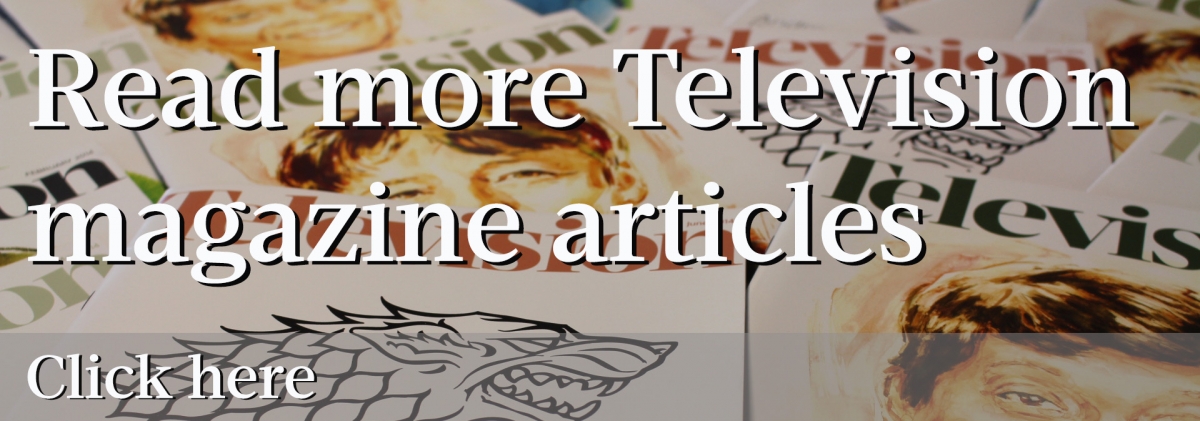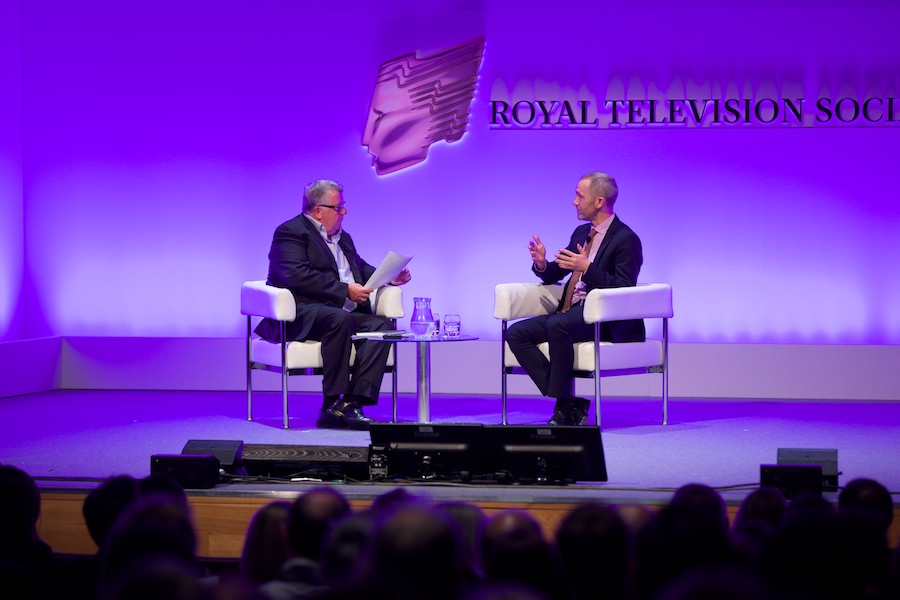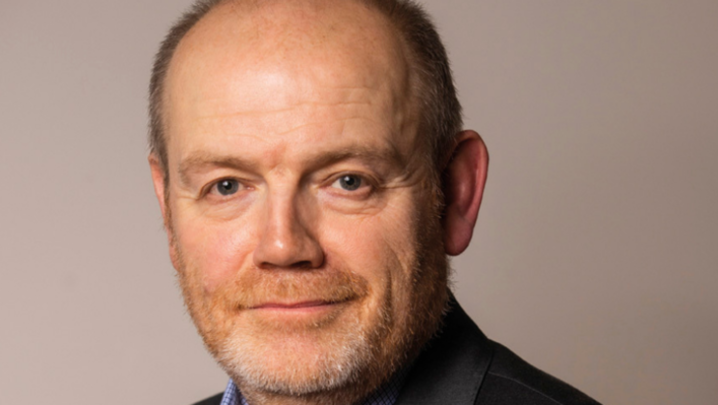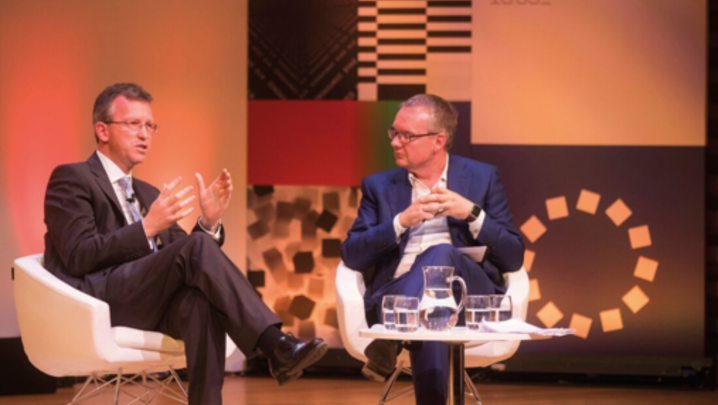BBC Strategy Director James Purnell is keeping his powder dry until Charter hostilities open in earnest
With the recent appointment of Rona Fairhead as Chair of the BBC Trust, potential licence-fee decriminalisation and pressure building on Charter renewal, James Purnell had plenty of questions to answer on the "Future of the BBC".
But despite the best efforts of writer and broadcaster Steve Hewlett, who chaired the session, the corporation's Director of Strategy and Digital managed to sidestep most of them during a good-natured, one-to-one interview.
On the morning of the RTS's London conference Fairhead had attended a pre-appointment hearing before MPs on the Culture, Media and Sport Committee.
She offered support for the present funding model: "I think there are some very, very significant benefits of the licence fee. It ensures independence, a universal service for a universal fee, which is very important and ensures creative freedom."
Fairhead, however, was less enthusiastic in her backing for the BBC Trust: "If it continues in its current form, for me, that's fine, if it changes – that's fine."
Picking up on Fairhead's comments about the licence fee, Purnell also offered his support, citing BBC audience data: "Support for the licence fee is significantly up in this Charter period [and] perceptions of value for money is also significantly up."
"We think the licence fee is the right way of funding the BBC," he added, "but we're not going to pre-empt the Charter review and start saying we know all the answers."
Purnell argued that the licence fee was the basis for a BBC that "is universal, independent, which can provide good value for money because of the huge economies of scale that come from the licence fee, and which has got creativity and distinctiveness at its core.
 "People sometimes say about the licence fee that, like democracy, it's the least bad way of funding the BBC – we actually don't agree with that."
"People sometimes say about the licence fee that, like democracy, it's the least bad way of funding the BBC – we actually don't agree with that."
Nevertheless, Purnell admitted that the funding mechanism had been coming under more pressure. "It used to be very clear every five or 10 years that we'd have this discussion, but it feels more year to year now," he said. "There is a little bit more of a sword of Damocles over us than there was."
Purnell, though, was quick to exonerate the current administration from blame for creating this uncertainty. "The Government has gone about it very properly, in terms of saying that Charter renewal will start after the general election," he said.
Culture Secretary Sajid Javid was due to speak later in the afternoon at the RTS conference, but he had already trailed his announcement that the Government's review of decriminalising non-payment of the licence fee would take place earlier than expected.
In briefings to the media the night before the conference, Javid said: "I don't want to pre-empt the Charter review. I want to ensure that, when it begins, it has a solid evidence base on which to draw."
Purnell revealed that the BBC was "very happy with the review being brought forward".
He added that Fairhead had been "very clear" on the corporation's view on decriminalisation at the select committee that morning.
"She was saying that it's clearly important to have a deterrent that works – both in terms of getting everybody to pay, so there's no free riding, and that works for the criminal justice system, but also that allows us to collect the money," he said.
The review is promoted by the Government's belief that the system isn't working. It says that 10% of the cases in magistrates' courts involve licence-fee evasion.
It is estimated that around 5.5% of households avoid paying, but could this figure rise if the offence was decriminalised, asked Hewlett.
"If there are any consequences on BBC income, either the Charter needs to reflect that, and we provide fewer services, or the other sources of funding have to go up," argued Purnell.
Changing tack, Hewlett asked if the BBC was looking at "alternative or additional sources of funding", and added a suggestion: "What about making iPlayer access conditional on having a TV licence?"
"I can exclusively today reveal that we are looking at advertising, [and] we are looking at download-to-own and subscription [with] UKTV and BBC Store," replied Purnell.

BBC Store is a new online commercial service that will allow users to buy new programmes and some older content from the corporation's archives on a download-to-own basis.
"Wouldn't it be easier, relatively, to make iPlayer access conditional... you could maybe exclude news, which you might say should be universally available, come what may. But... to download programmes... at no additional cost, you need [to have a licence]?" persisted Hewlett.
Purnell pointed out that Director-General Tony Hall had promised to personalise the iPlayer in his speech in October last year at the BBC's London Radio Theatre, when he set out his vision for the corporation.
"That will clearly involve people having to sign in to BBC services. We've also said that we will want to look at modernising the licence fee, because we don't think there should be a different way of treating people who watch programmes on catch-up and live," he explained.
Turning to BBC cutbacks, Hewlett noted that the Director-General had "talked about the consequences of the last settlement, as he now understands it, being a 26% cut in UK services".
If this was the case, he suggested, the BBC could not continue to offer the same level of service – could it?
Purnell agreed but said that simply cutting services across the board was not the answer. "We formed the view that you couldn't just take another x% from everywhere, because it was getting too close to the bone.
"Things such as drama were being cut back in a way that was dangerous if we wanted to remain world class. We had to make some big decisions and that's why we decided to close BBC Three," he concluded.
Session Eight, "The Future of the BBC", was produced by Martin Stott. James Purnell, BBC Director of Strategy and Digital, was interviewed by writer, broadcaster and media consultant Steve Hewlett.
Question & answer
Q Steve Hewlett: [At the select committee this morning] Rona Fairhead said that she would be "very surprised" if the [BBC's] system of governance remained the same... She went on to say that it was not her role to defend the current structure. What's your view?
A James Purnell: We think that, as the regulatee, we need to be a bit circumspect in the debate... Our focus for the next few years, as [Rona] also said, is making sure that the current system works effectively.
Q Steve Hewlett: Is it your perception, personally, that the Trust is bust?
A James Purnell: Our job is to make the system work.
Q Steve Hewlett: Some things went quite badly wrong... the executive pay-offs, the [failed £100m IT project] Digital Media Initiative... What's your diagnosis... was it the people, was it the system?
A James Purnell: [I don't] want to go back into what happened in the past.
Q Steve Hewlett: Well it might help us to fix it.
A James Purnell: Well, you can look at what we said in terms of the review, and both sides thought there had been a blurring of responsibilities and that meant there was a lack of clarity in terms of execution sometimes. The best way of fixing that was to separate out those roles much more.
Q Steve Hewlett: Is it your view that if that is fixed in the way you say, [the Trust] is sustainable?
A James Purnell: It's not for me to reply to that.






